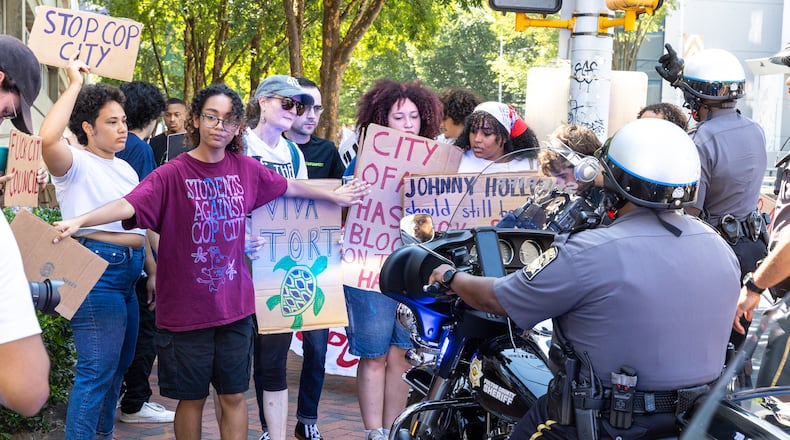Opponents of Atlanta’s public safety training center are criticizing the local government’s “highly and unnecessarily restrictive” proposal for how the city wants to verify the legitimacy of the petition signatures intended to force a public vote on the facility.
City officials announced Monday afternoon that former city clerk Emeritus Foris Webb III will return to City Hall to help supervise a line-by-line process to verify each signature collected against state voter registration records.
“Petition lines that do not pass the verification process will have detailed documentation as to the reason for the non-verification status,” city officials said in a statement.
On Tuesday, the Vote to Stop Cop City coalition said in a statement that “this long-overdue insight” into the city’s plans for the referendum process raises serious concerns because it “far exceeds the standards required by law.”
The coalition cited reporting from The Washington Post and The Atlanta Journal-Constitution that unveiled how signature matching historically disenfranchises voters and elicits legal challenges over its application. The coalition called the city’s proposed plan “a discriminatory procedure.”
“We echo the alarm of voting rights organizations like Fair Fight and the New Georgia Project,” coalition spokesperson Kate Shapiro said in a statement.
“In addition to the clear problems raised, there are critical questions the City has left unanswered. How will voters know if their signature is rejected? Will observers be present during the verification process? If a signature is rejected, can a voter appeal or cure the error so that their signature can be counted?”
The coalition wants to city to proactively provide a process for voters to “cure” their signatures, or give provide a way for voters to find out if their signature has been rejected or counted as soon as that decision is made, and to tell them how they can fix, or “cure” their signature if it is rejected.
The coalition called Georgia’s cure provision “a narrow one that has been criticized by voting rights organizations as too restrictive,” and yet they also said City Hall “has not even committed to this minimal protection for voters.”
“This will help to ensure that every eligible signer has their petition signature counted fairly and accurately,” the coalition said in a statement.
On Tuesday afternoon, a city spokesperson said “there will be a cure process” within the city’s verification plan.
Two years have passed since Atlanta’s previous City Council class voted to build an 85-acre facility on 380 acres of city-owned land in southwestern DeKalb County’s South River Forest. The complex is set to completed by the end of 2024, which would give Atlanta police and firefighters a new home for training.
But the plan has been met with opposition that has often resulted in violent clashes between officers and opponents. One protester was fatally shot near the site in January.
In June, a day after the council Atlanta City Council voted in the early morning to approve $67 million in city funding for the facility, the opponents launched their referendum campaign.
Opponents of the facility have until Sept. 23 to collect 58,203 signatures to qualify for the referendum. Then, the municipal clerk will have 50 days to confirm the list has enough qualifying signatures of registered voters and present the petition to the City Council.
On Monday, the council OK’d plans for the city’s legal department to hire outside counsel to help in the city verify the petition signatures.
That said, lawyers working for the city have argued the referendum law doesn’t apply to cities, and that no referendum can undo a lease signed and enacted by both the city and the Atlanta Police Foundation regardless of the number of signatures collected.
Ultimately, the court will likely decide the if petition effort if valid.
The coalition claims to have collected more than 104,000 signatures. During Monday’s council meeting, former council candidate Devin Barrington-Ward said he’s grateful the petition is shaping up to give the community an opportunity to decide if the training center is right for Atlanta.
“The best form of public safety is democracy. Some of you all have stood in the way of this ballot referendum, you’ve stood in the way of the will of the people after hours and hours and hours of public comment and at this point, this isn’t about redeeming yourselves,” Ward said. “I don’t know if you can do that in the eyes of many, but what this is about is about doing the right thing, which is upholding democracy.”
About the Author
Keep Reading
The Latest
Featured



